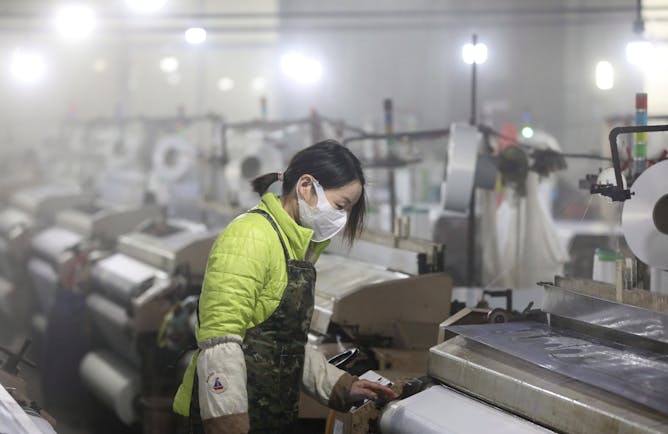|
The coronavirus continues to roil markets and impact business operations. Around the globe, conferences are being cancelled, business travel is being put on hold, face-to-face meetings have been scrubbed and interest rates are being cut to protect the economy from any further battering as the outbreak spreads. Italy has ordered the quarantine of 16 million people, while closer to home, Tim Hortons has even removed the cups from its beloved Roll up the Rim contest.
Today in The Conversation Canada, Sean Spence of the University of Portsmouth explains how business continuity and crisis management plans can help companies get through crises like global disease outbreaks, disasters and rail blockades, especially when interconnected critical infrastructure is taking a hit.
Also in today’s edition:
Four interesting reads to kick off your week.
|

A woman works at a textile factory in Hangzhou in February 2020. The disruption of Chinese manufacturing in the midst of the coronavirus is causing global supply chain issues.
(Chinatopix via AP)
Sean Spence, University of Portsmouth
Crisis management and business continuity plans are powerful tools for companies to remain resilient and operational when unforeseen circumstances disrupt the availability of critical infrastructure.
|

Research shows Canadians want to move away from the GDP as a measurement of progress, prosperity and happiness, and consider protecting the environment more critical than growth. A hiker is seen here in British Columbia.
Alex Shutin, Unsplash
Fernanda Tomaselli, University of British Columbia; Sandeep Pai, University of British Columbia
With a deepening climate crisis, unprecedented biodiversity loss and widespread inequality, it's pertinent to question if indefinite GDP growth will deliver true and long-lasting prosperity.
|

The extent to which parents and educators encourage children to think mathematically in the years before they enter grade one are critically important for math foundations.
(Shutterstock)
Helena Osana, Concordia University
Math is not primarily about numbers, but about thinking. It all begins with parent-child conversations about mathematical ideas.
|

Parc-Extension in Montreal is a neighbourhood in transition with dire consequences for low-income families. Here a photo of: Villeray-St Michel-Parc Extension.
Flickr
Alessandra Renzi, Concordia University; Aaron Vansintjan, Birkbeck, University of London; Emanuel Guay, Université du Québec à Montréal (UQAM); Tamara Vukov, Université de Montréal; Vijay Kolinjivadi, University of Antwerp
Gentrification often leads to the eviction of poor and largely racialized populations. When a university campus drives the change, they can choose to do something about it.
|
La Conversation Canada
|
-
Valentin MIGABO, Université du Québec à Montréal (UQAM)
La lutte armée en RDC, qui implique une centaine de groupes, est utilisée par le pouvoir et les trafiquants pour semer le chaos, dans le but de rendre le pays ingouvernable.
|
|
Arts
|
-
Hugh Ellis, Namibia University of Science and Technology
In urban Namibia, performance poetry provides a safe space for women to share their experiences and challenge traditional ideas.
|
|
Culture + Society
|
-
Sariya Cheruvallil-Contractor, Coventry University
My new research highlights a little known story of women’s roles in British Muslim history.
|
|
Environment + Energy
|
-
Wannes Hubau, Royal Museum for Central Africa; Aida Cuní Sanchez, University of York; Simon Lewis, UCL
Scientists behind a major new study explain how they discovered these forests are becoming less able to sequester carbon.
|
|